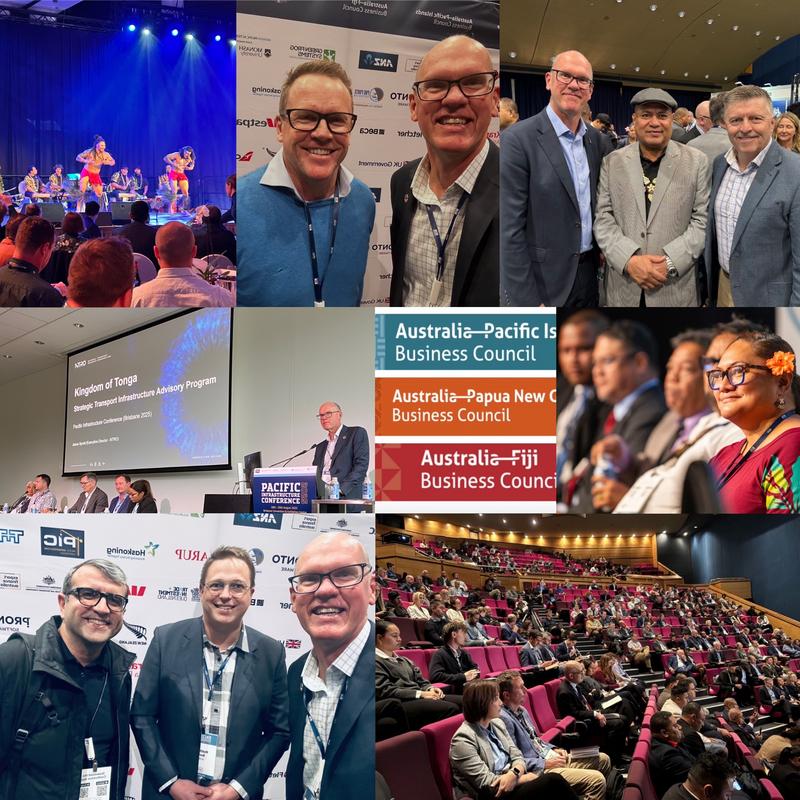The Pacific Infrastructure Conference 2025 concluded in Brisbane after three days of high-level discussions, presentations and networking, drawing 652 delegates, 80 speakers and more than 40 exhibitors from 20 countries.
Hosted from 18 to 20 August, the conference brought together political and business representatives from all 16 Pacific Island countries as well as Australia, New Zealand, Japan, France and development agencies such as ADB, World Bank and UNDP, solidifying its reputation as the region’s most inclusive infrastructure forum.
The gathering provided a platform for stakeholders across the Pacific, Australia, New Zealand, Japan, the United States, the United Kingdom and the European Union to exchange views on infrastructure priorities. Development partners, investors and contractors also took part, underscoring the growing interest in the Pacific’s development agenda.
One of the largest delegations was fielded by the Asian Development Bank, which sent around 25 representatives to engage in panel discussions and bilateral meetings. Pacific leaders meanwhile outlined their national infrastructure priorities in well-attended breakout sessions, drawing keen interest from consulting firms, contractors and financiers.
A major draw of the event were the two Memoranda of Understanding signed by the Australia Pacific Islands Business Council (APIBC) with the Niue Chamber of Commerce and the New Caledonia Chamber of Commerce and Industry Trade and Invest. These agreements strengthen regional business ties and raise the total number of such MoUs organised by APIBC to 11.
The private sector’s role was notably strong, with Pacific Island chambers of commerce and business representatives actively shaping infrastructure priorities. More than 40 exhibitors showcased technologies and services across renewable energy, digital connectivity, water, transport and construction sectors—highlighting innovation and practicality in equal measure.

NTRO, the National Transport Research Organisation, attended the conference to present climate resilience solutions to over 650 delegates, including Pacific nation representatives and partner countries such as Korea and France National Transport Research Organisation.
Their executive director, Jason Sprott, praised APIBC’s efforts and emphasised the urgency of resilience: “We are terribly motivated to continue our work throughout the region … our infrastructure resilience work across roads, aviation and maritime sectors is critical for the safety, economic viability and continued prosperity of the region and its amazing people” National Transport Research Organisation.
Australia’s Minister for Pacific Island Affairs and Defence Industry, the Hon Pat Conroy MP, addressed delegates at the Brisbane Convention and Exhibition Centre. He reaffirmed that Australia’s infrastructure investments are Pacific-led, climate-resilient, inclusive in design, transparent and focused on local leadership, jobs and procurement Australian Foreign Affairs.
He cited nearly A$2 billion committed by the Australian Infrastructure Financing Facility for the Pacific across 56 projects in 11 nations. Projects mentioned include school sports courts in Kiribati, maintenance of PNG’s Wau Highway, and upgrades to Tonga’s Queen Salote International Wharf Australian Foreign Affairs.
The minister also announced the extension of Qantas’s “Paradise Express” flights connecting Australia and Palau until the end of 2026—and planned submarine cable rollouts that will link all Pacific Island Forum countries by year-end Australian Foreign Affairs.
Simon Gorman, President of the Australia Pacific Islands Business Council, said: “This year’s conference brought together leaders and partners from across the Pacific to discuss the region’s infrastructure needs and opportunities. The participation of more than 620 delegates underlines the importance of collaboration, and the MOU signed with Niue and New Caledonia chambers show how business councils can help strengthen regional partnerships.”
The conference was hosted by the Australia Pacific Islands Business Council, the Australia Papua New Guinea Business Council and the Australia Fiji Business Council, with support from the Australian Government’s Office of the Pacific as major sponsor, complemented by sponsorship from numerous government and business organisations in Australia and New Zealand.










